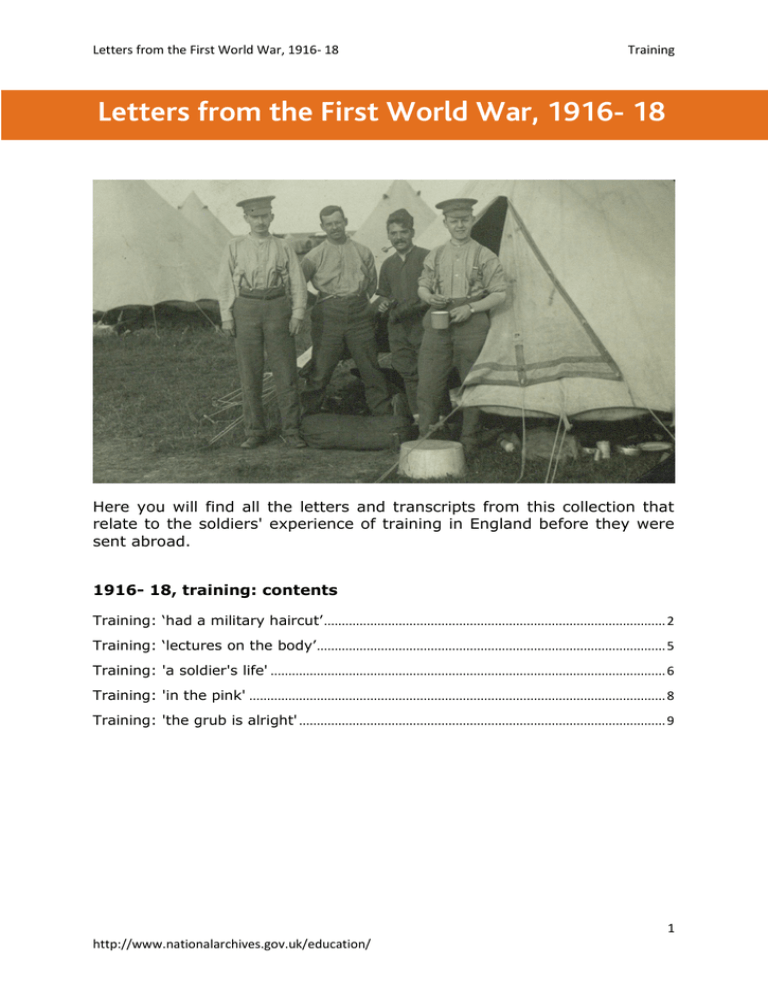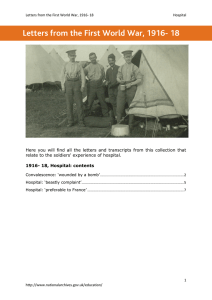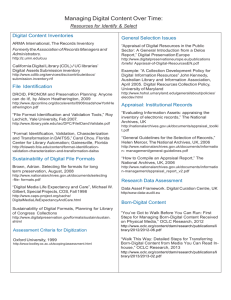Letters from the First World War, 1916- 18
advertisement

Letters from the First World War, 1916- 18 Training Letters from the First World War, 1916- 18 Here you will find all the letters and transcripts from this collection that relate to the soldiers' experience of training in England before they were sent abroad. 1916- 18, training: contents Training: ‘had a military haircut’ ................................................................................................ 2 Training: ‘lectures on the body’ .................................................................................................. 5 Training: 'a soldier's life' ............................................................................................................... 6 Training: 'in the pink' ..................................................................................................................... 8 Training: 'the grub is alright' ....................................................................................................... 9 1 http://www.nationalarchives.gov.uk/education/ Letters from the First World War, 1916- 18 Training Training: ‘had a military haircut’ Sidney Smith, undated, Longmoor Camp, England. Born: 20 October 1881, Regiment: Railway Engineers, Regiment Operatives Division, Royal number: 218849, Rank: Sapper, Returned to office: 19 May 1919, Retired: 20 October 1941 Transcript Dear Mr Beak and all, My address shows you I am well in now. Oh it is a different life and comes hard at first, four blankets on the floor and it is hard. I didn’t get used to 2 http://www.nationalarchives.gov.uk/education/ Letters from the First World War, 1916- 18 Training it until last night which was my first night’s proper rest. The food is fair but served very rough and not enough after the drills you have to go through. The weather has of course been very bad and I am still in the same things as I left London last Monday. I look like a tramp and my collar, of the colour, something like the office grate. I was inoculated last Thursday but was not so bad but some of the fellows felt it. I expect I shall have a time with the next lot but hope I don’t as they have not got much sympathy and of course there is no comfort. A lot of fellows (about four hundred and fifty) have been shifted (Saturday and today) to Bordon and we shall all probably go when we get fitted out as they are making a new camp there with three new companies. It cannot be worse than here which is very dreary and lonely and the nearest village (Liss) is three miles away where several of us went on Saturday and Sunday and had tea. That place is I may say, truly rural. I have had a military hair cut tonight and feel that I look like Bill Sykes. I am afraid none of our young ladies would care to be seen walking up number 1 (platform at Paddington Station) with me as I look at the moment. (censored.) There is no leave now, only when you get your overseas leave which is generally after six weeks here and when you come back you are the put on the draft so it isn’t long is it? George Jones and Isles will probably stay longer as they are to have false teeth but me, although as you know, I have got a very bad lot of teeth was passed and they are not touching mine. Army ways are funny and I have already found out a lot of which I trust I shall one day be able to tell you. I forget to tell you we all got split up into different huts when we arrived and mine is about a mile away from the camp. It is very comfortable however much better accommodation than at the camp. Three other of our fellows were put in there with me and I found some others, also some very nice London & North Western Railway chaps, one of whom knew Mr Bryant and all the Fares office chaps. He was the head of the Season Ticket Office at Euston. I might say that they have been very good to me and assisted me more than some of our chaps, one or two of whom I am sorry to say have not done what they might to assist others and I (together with some of the others) have been surprised but of this more 3 http://www.nationalarchives.gov.uk/education/ Letters from the First World War, 1916- 18 Training anon when we meet. Well I bid you all adieu for the present. I think of you all often and only wish I was back again but it has to be done and one can only hope the end will come soon. I hope poor old Syd Douce is getting on alright as we have not heard how he is. Now good luck to you all and every success and tell them all that could go to keep out of this life as long as they can. Goodnight. I may say that four of our chaps who were lucky to get their outfit last week were moved to Bordon this afternoon: G. Holloway, Isles, Borrough, G.R.J. Jones. Yours very sincerely, S. Smith. 4 http://www.nationalarchives.gov.uk/education/ Letters from the First World War, 1916- 18 Training Training: ‘lectures on the body’ Frank Edward Secrett, Royal Army Medical Corps, 29 April, 1917, Blackpool training depot, England. Regiment: Royal Army Medical Corps, 97469, Rank: Private, Enlisted: 6 June 1916, Discharged: 21 July 1919 Transcript (extract) … Am enclosing a photo of myself, it is, I have been told, not a good likeness, but there it is. We have any amount of lectures on the body etc., and presently have to pass an examination, if successful the red crosses are issued and also 4d (pennies) per day extra pay. Leave is only granted once in nine months and then only six days at the most, in some cases only four is given, so I shall not be up yet, but will make a point of course of coming up to Paddington when I do get a chance. Blackpool is a lovely place and the weather now is grand, although the first fortnight was bitterly cold. Well I must now close, with a hope to hear from you shortly, please give my kind regards to all acquaintances. F. Secrett 5 http://www.nationalarchives.gov.uk/education/ Letters from the First World War, 1916- 18 Training Training: 'a soldier's life' Routine of a soldier’s life told in a few well-known hymns composed by members of Heather Tent, Scotland. This was included in the newsletter for the Great Western Railway Paddington Audit office in May 1916. It was probably sent in by one of their staff who was training at a camp in Scotland and then typed out by the office. It provided a wonderful insight into the training schedule and possible thoughts surrounding it! 6 http://www.nationalarchives.gov.uk/education/ Letters from the First World War, 1916- 18 Training Transcript 5.30 am Revielle Christians Awake 6.45 am House Parade 7.00 am Breakfast 8.15 am Company parade 8.45 am Manoeuvres Art though weary thou languid Meekly wait and murmur not Fight the good fight 11.15 am Swedish Drill 1.00 pm Dinner Here we suffer grief and pain Come ye thankful people come 2.15 pm Rifle Drill 3.15 pm Lecture by Officer 4.30 pm Dismiss 5.00 pm Tea 6.00 pm Free for the night 6.30 pm Out of bounds Go labour on Abide with me Praise God from whom all blessings flow What means this eager anxious throng? 10.00 pm Last post 10.15 pm When he cometh Oh what will the harvest be? Oh Lord how happy shall we be All are safely gathered in Lights out Peace Perfect Peace 10.30 pm Inspection of Guards Sleep on beloved GOD SAVE THE KING 7 http://www.nationalarchives.gov.uk/education/ Letters from the First World War, 1916- 18 Training Training: 'in the pink' Frank Thayer Turner, 13 July 1916, Morn Hill Camp, Winchester, England. Born: 22 October 1897, Joined GWR: 13 April 1912, Regiment: Company 3/18 London Irish Regiment, Returned to office: 5 November 1917. He lost his right arm in the war. Died: 28 May 1937 Transcript Dear Jim (Mr Porter) Just a few lines to let you now things are going. Am having a fairly good time nothing at all to grumble about. I don’t think I shall be going to France for a few months yet. I met one of the chaps from the tickets department last week he is in the R.F.C. down here. Some of us were feet under canvas for a fortnight but owing to the wind and rain we were moved back to the huts. When we were under canvas, we used not get up till 8 o’clock, we were supposed to go on parade at 6.15am, but we dodged that. I enclose photo (not dressed for the occasion) outside our hut L20 or Hell 20 as it has been called. I am looking forward to seeing some of the office chaps when I am able to get leave. I hope your brother is getting on alright in France. Hoping you are ‘in the pink’ like myself, Yours very sincerely F. Turner. Please write as soon as poss. 8 http://www.nationalarchives.gov.uk/education/ Letters from the First World War, 1916- 18 Training Training: 'the grub is alright' Sydney Charles Douce, January 1916, Fovant Camp, Wiltshire. Born: 17 November 1882, Joined GWR: 28 November 1898, Regiment: 1/5 London Regiment; 3rd Battalion London Rifle Brigade; Royal Army Medical Corps, Regiment number: 3701; 202204; 536657, Rank: Private, Died: 1933. Transcript Dear Mr. Riches The worst has happened. The War Office has sent us down to this place which is miles from nowhere. The camp however is made up of hundreds of huts is according to the ‘old uns’ at the game the finest they have ever been in, certainly everything is alright but the place is so muddy and my time is split up. One half getting frightfully dirty and the other getting myself clean again. However it’s all in the game and can’t be helped. There are twenty to a hut. The beds are three long boards on two trestles about eight or nine inches off the floor, a straw mattress and a straw pillow, and four blankets. Not a bit what I have been used to. However I am now quite comfortable in it and sleep like a top. Marvellous how you think we settle down to it. Don’t you think? We rise at 6.30am. Breakfast (porridge and bacon) at 7.30. Parade at 8.20. Drill till 10.30. Then half an hour’s rest. Then more drill up to 12.30. Dinner at 1 o’clock (meat and two vegetables and sweets). Parade again at 2.20. Then more drill which brings us up to 4pm. We are then dismissed for the day. Tea at 5pm 9 http://www.nationalarchives.gov.uk/education/ Letters from the First World War, 1916- 18 Training (bread, butter and jam). After which we can do what we like until 9.15. By this time we have to be in our huts for the final day’s roll call and at 10pm. All lights have to be out. That’s what my day consists of at present. It may not seem much, and really it isn’t, but I am half the day cleaning up. The grub is alright but there is not quite enough of it at present. I think however this will be right as soon as they have made all necessary arrangements. For the time being the Non-Commissioned Officers seem to be a little overworked. This is the same every day, varied on two mornings a week with a long route march in the morning. Of course we only have half a day on Saturday and only a Church parade on Sunday. So altogether things are not so bad. The only thing is I can’t get away for weekends, as it would take up most of the time to travel to London and back. I shall try however and run up to town in a few weeks’ time if possible. Kind regards to all at ‘Omega’, and everybody at 164, W.1, including, yourself. Yours, S.C.D. 10 http://www.nationalarchives.gov.uk/education/






